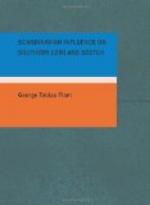The numbers given in the references are self-explanatory. They are generally to page and line, in some cases to book and verse, as in Bruce and Wyntoun. T.W.M. refers to Dunbar’s “Twa Mariit Wemen.” F. to “The Flyting with Kennedy.” F. after Montgomery’s name refers to “The Flyting.” G.T. refers to Dunbar’s “Golden Targe,” and C. and S. to Montgomery’s “Cherrie and the Slae.” M.P. to the “Miscellaneous Poems” and S. to the “Sonnets.”
Only words that are specifically Scotch in form or usage have been included. Very well known Scotch words, that occur in older Scotch as well as the modern dialects, such as blether, busk, ettle, kilt, etc., are given without references to texts where they have been found, otherwise one or more references are given in each case. For the sake of comparison and illustration Shetland and Cumberland forms are frequently given. Wherever a W. Scand. source is accepted for a loanword the O.N. form is given if it be different from O. Ic. Examples from Danish dialects or Swedish dialects are given as Dan. dial. or Sw. dial. Those from Norse dialects are cited as Norse simply. Those that are specifically literary Norse are cited as Dano-Norse.
PART II.
LOANWORDS.
AGAIT, adv. uniformly. R.R. 622.
Sco. ae, one, + O.N. gata
literally “ae way,”
one way.
AGAIT, adv. astir, on the way. See Wall.
AGROUF, adv. on the stomach, grovelling.
Ramsay, II, 339. O.N.
a grufu, id. See
grouf.
AIRT ([)e,]rt), vb. urge, incite, force, guide,
show. O.N. erta,
to taunt, to tease, erting,
teasing. Norse erta, oerta,
id. Sw. dial. erta,
to incite some one to do a thing. Sw.
reta shows metathesis.
M.E. ertin, to provoke.
ALLGAT, adv. always, by all means. Bruce,
XII, 36; L.L. 1996. O.N.
allu gatu. O.
Ic. oellu g[o,]tu. See Kluge, P.G.(2)I,
938.
ALGAIT, ALGATIS, adv. wholly. Douglas,
II, 15, 32; II, 129, 31.
See Kluge, P.G.(2)I., 938.




